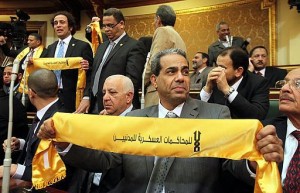
On a podium in Tahrir square on Friday, President Mohamed Morsi vowed to release all civilians detained in military jails, as well as work toward acquitting the blind Sheikh Omar Abdel Rahman, long detained in a United States prison.
Shahira Abul Leil, one of the founding members of the No Military Trials for Civilians movement, who watched the speech with other members of the movement, refused to hang much hope on the president’s promise.
“We’ve heard similar promises from people in office before, yet, all to no avail.” Abul Leil told the Daily News Egypt. “We have been weary from the extensive hard work during the past 18 months, trying so hard to get as much civilians out of military prisons as possible, succeeding only in few instances.” Abul Leil likened the movement’s work to ‘sculpting hard rocks.’
Despite President Morsi’s Friday promise, he released a statement Thursday stating he was told all those currently inside military prisons are thugs whose acquittal might lead to sparking chaos. The statement, in Abu Leil’s estimation, was contradictory to the president’s latest promise.
Abul Leil said there are no accurate estimates of how many civilians currently face military judicial proceedings. The movement is barred from looking at official records, which may provide an accurate number. Nevertheless, Abul Leil puts the number roughly at a “very modest estimate” of 8,000 civilian prisoners inside military jails. “We’re giving the newly elected president a period of a week to act upon his promise,” Abul Leil said. “Should there be no reaction from his side, the No Military Trials movement is sure to react.”
The reaction, according to Abul Leil, would be a very strong campaign against military detention, including the release of new videos about military trials. The movement would also resort to using human chains to protest the trials and coordinate web-based protests.
Plans are also underway to organise a global day of solidarity with civilians in military prisons across the world. “Now that Egypt finally has a civilian president,” Abul Leil said. “The entire mechanism of military detention and trials needs to be altogether removed.”



